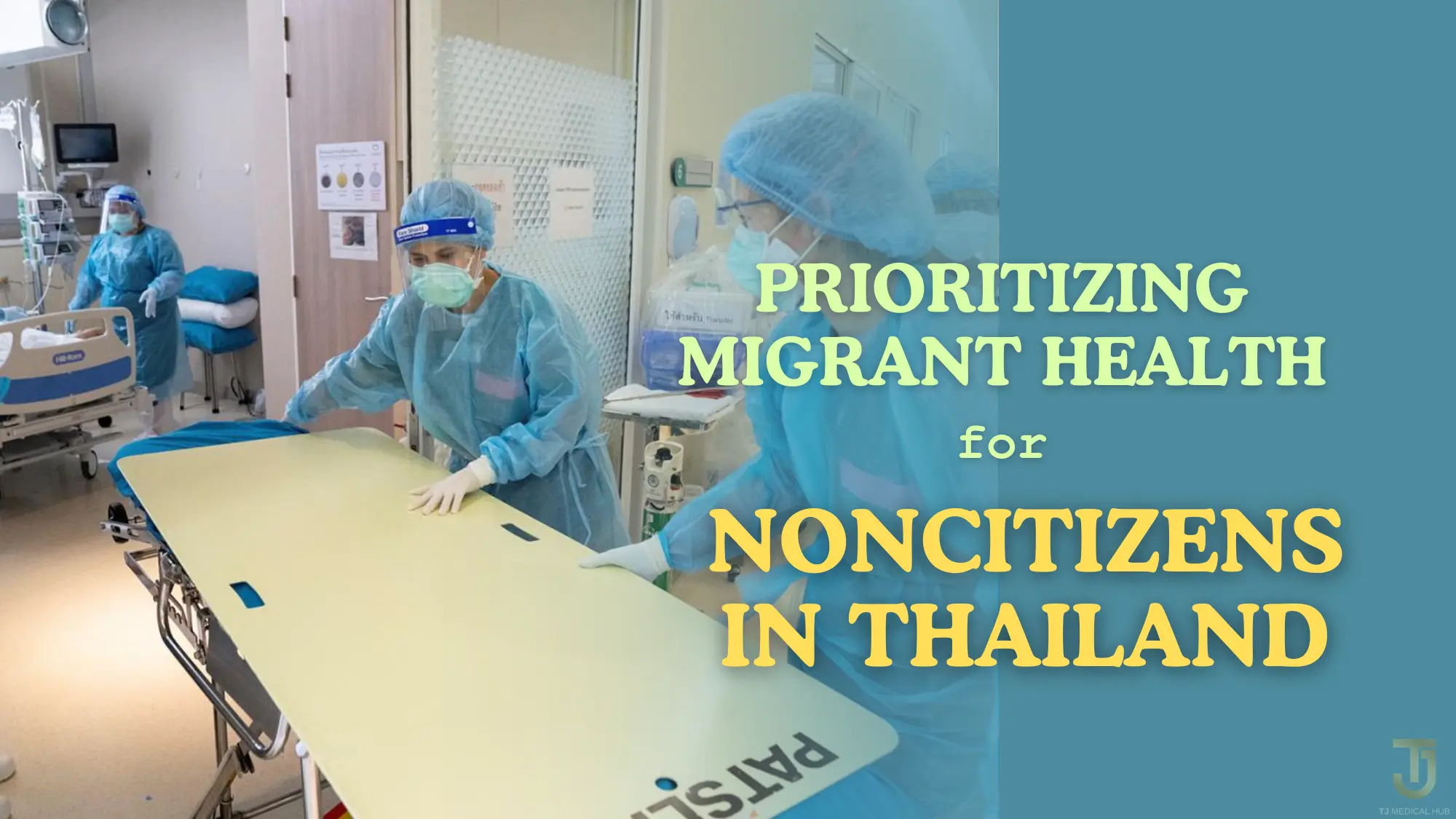The COVID-19 pandemic brought forth unprecedented challenges to global healthcare systems, laying bare disparities across nations. In this context, Thailand shines as a model for inclusive immigrant healthcare management. This comprehensive exploration delves into Thailand’s approach, revealing key elements and vital lessons applicable to the global community. Through a long-term perspective and the fostering of inclusivity, Thailand effectively mitigated the impact of COVID-19 on its migrant communities while promoting social harmony within its borders. The success of Thailand’s approach can serve as a beacon for enhancing immigrant healthcare, refugee healthcare, and the overall well-being of foreigners, nomads, mobile populations, transients, non-citizens, immigrants, refugees, and stateless individuals in other countries, fostering a more equitable and harmonious world.
Understanding Inclusivity in the Context of COVID-19 Management.

Thailand’s healthcare system exhibited a remarkable level of inclusivity throughout the COVID-19 pandemic, setting it apart from neighboring countries where nationalist sentiments often overshadowed discussions on migrant health. Central to this achievement is Thailand’s three-decade progress in securing healthcare rights for migrants, which proved instrumental in reducing xenophobia. The evolving “social contract” within Thailand now encompasses both Thai citizens and non-Thais, effectively diffusing nationalistic rhetoric. This inclusive approach, complemented by a forward-looking perspective, played a pivotal role in ensuring equitable healthcare access and treatment during the pandemic.
Thailand’s approach to inclusivity in managing COVID-19 among its migrant population represents a significant departure from the experiences of its neighboring countries. Here, we delve into the key components of this approach and the impact it had during the COVID-19 pandemic.
- Reducing Xenophobia through Healthcare Rights: Thailand’s healthcare system has achieved remarkable inclusivity, and this achievement can be attributed to three decades of progress in securing healthcare rights for migrants. This progress significantly reduced xenophobia and negative sentiments towards non-Thais. By ensuring that migrants have access to healthcare services, Thailand not only prioritized the health of its migrant population but also fostered a sense of belonging and acceptance within the broader society. The inclusivity in healthcare was an integral part of the country’s successful COVID-19 management strategy, as it encouraged all individuals, regardless of their nationality, to seek testing and treatment when necessary.
- Expanding the “Social Contract”: An important element of Thailand’s approach was the evolution of its social contract to include both Thai citizens and non-Thais. This shift effectively diffused nationalistic rhetoric and divisive debates about healthcare access. As a result, the conversation during the pandemic revolved around inclusivity, shared responsibility, and a commitment to ensuring healthcare equity. This holistic perspective not only strengthened the nation’s response to COVID-19 but also set an example for other countries grappling with similar issues.
- A Forward-Looking Perspective: Thailand’s approach wasn’t just limited to the immediate needs of the pandemic. It encompassed a forward-looking perspective that considered the long-term implications of inclusive healthcare policies. By embracing this broader viewpoint, Thailand laid the foundation for a more resilient and cohesive society, where the importance of equal access to healthcare services became a fundamental principle.
Long-Term Perspective and Inclusive Policy
Thailand’s strength lies in its ability to engage in long-term discussions regarding migrant healthcare, rather than addressing pressing issues only during the peak of the COVID-19 crisis. Questions about the financial aspects of healthcare have been addressed proactively, with migrants themselves predominantly contributing to insurance premiums. The comprehensive nationality verification process has been a cornerstone in transitioning undocumented migrants into the official healthcare system, a crucial element in fostering trust and reducing crime and human trafficking. This strategic move has not only boosted the economy but also ensured compliance with international laws, making it a role model for ethical and inclusive healthcare practices.
This forward-thinking and practical approach to migrant healthcare can serve as a global blueprint for improvement.
This progressive and pragmatic model for migrant health serves as an invaluable foundation upon which the world can build and enhance its own healthcare systems for migrants. By adopting a similar approach that prioritizes inclusivity, long-term perspective, and shared responsibility, countries worldwide can promote the well-being of their migrant populations, reduce xenophobia, and ensure equitable access to healthcare services during health crises. These lessons from Thailand provide a roadmap for creating more resilient and harmonious societies, where the health and dignity of all residents, regardless of their nationality, are respected and protected.
Crucial takeaways for nations like Malaysia, Singapore, Turkey, Lebanon, and Germany to consider.
In contrast to Malaysia and Singapore, where the discourse on migrant health during COVID-19 occasionally veered toward nationalism, Thailand exhibited a different narrative. Several factors account for this contrast. Thailand’s three decades of progress in securing migrants’ health rights have notably diminished xenophobia within its society. The nation’s social contract has evolved, acknowledging the rights and responsibilities of both Thais and non-Thai residents living among them. Discussions on the complex issue of cost allocation, which often escalates during crises like the height of the COVID-19 pandemic, have occurred incrementally over the years, contributing to more satisfying resolutions for the Thai populace.
Crucially, these discussions have been resolved amicably, largely due to migrants themselves predominantly bearing the cost of insurance premiums. The comprehensive nationality verification process has played a pivotal role in transitioning undocumented migrants into the official system. This not only fosters trust within the society but also contributes to a reduction in crime and human trafficking. Furthermore, it strengthens the economy and bolsters official statistics, all while aligning with international laws and ethical standards.
These lessons from Thailand present vital insights for other countries grappling with migrant and refugee health management, including Malaysia, Singapore, Turkey, Lebanon, and Germany. The focus on inclusivity, shared responsibility, and equitable healthcare can be a beacon of guidance in navigating the complex terrain of migrant health during crises and working towards a more cohesive, resilient, and ethical society.
Thailand vs. Malaysia and Singapore
Thailand’s approach to managing migrant health during the COVID-19 pandemic differs markedly from that of its neighboring countries, Malaysia and Singapore. Here, we delve into the distinct approaches taken by these nations and the implications of these differences.
n summary, the comparison reveals that Thailand’s approach, centered on inclusivity and shared responsibility, offers a distinct and more equitable approach to managing migrant health during crises like the COVID-19 pandemic. While nationalistic tones in discussions might prioritize the interests of citizens, Thailand’s model shows that it is possible to balance the well-being of both citizens and migrants, creating a more cohesive and resilient society during challenging times. These differences in approach underscore the importance of policy choices in shaping a nation’s response to healthcare crises involving migrant populations.
- Nationalistic Tone in Malaysia and Singapore: In Malaysia and Singapore, discussions surrounding migrant health during the pandemic occasionally took on a nationalistic tone. Nationalism in this context implies that the discourse was influenced by a focus on the interests of the nation-state, sometimes at the expense of more inclusive or humanitarian considerations. This nationalistic perspective can lead to debates that prioritize the interests of the country’s own citizens over those of migrants, potentially overlooking the health and well-being of non-citizen populations.
- Thailand’s Focus on Inclusivity and Shared Responsibility: In contrast, Thailand’s approach emphasized inclusivity, shared responsibility, and a commitment to ensuring healthcare equity. Rather than framing the discourse in a nationalistic context, Thailand’s healthcare strategy during the pandemic revolved around the principles of inclusivity and equal access to healthcare services. The focus was on treating all individuals, regardless of their nationality, with respect to their healthcare needs, thus promoting social harmony and cohesiveness within the country.
- Implications of the Contrasting Approaches: The differences in approach between Thailand and its neighbors have significant implications. Thailand’s emphasis on inclusivity not only ensured that migrants received necessary healthcare but also contributed to social harmony and a sense of belonging among migrant communities. In contrast, a nationalistic tone can lead to division and potentially neglect of the healthcare needs of migrant populations.
In summary, the comparison reveals that Thailand’s approach, centered on inclusivity and shared responsibility, offers a distinct and more equitable approach to managing migrant health during crises like the COVID-19 pandemic. While nationalistic tones in discussions might prioritize the interests of citizens, Thailand’s model shows that it is possible to balance the well-being of both citizens and migrants, creating a more cohesive and resilient society during challenging times. These differences in approach underscore the importance of policy choices in shaping a nation’s response to healthcare crises involving migrant populations.
Nevertheless
This new title aligns with the content of the article and emphasizes the focus on Thailand’s approach to migrant healthcare during the COVID-19 pandemic. If you have any further changes or additions you’d like to make, please let me know, and I’ll be happy to assist. We are prepared to bring you the latest news and positive developments. If you have any concerns or would like to engage in a discussion, please don’t hesitate to contact us at – TJ Medical Hub
Thailand’s remarkable experience in managing migrant health during the COVID-19 pandemic offers crucial lessons for other nations grappling with similar challenges, including Malaysia, Singapore, Turkey, Lebanon, and Germany. The Thai model emphasizes the importance of expanding the social contract, addressing healthcare financing, and implementing comprehensive nationality verification, underscoring that inclusivity and a long-term perspective are pivotal elements of effective healthcare policy. These lessons provide a robust blueprint for countries worldwide, demonstrating how a commitment to equitable healthcare can lead to stronger, more resilient societies in an increasingly interconnected world.


